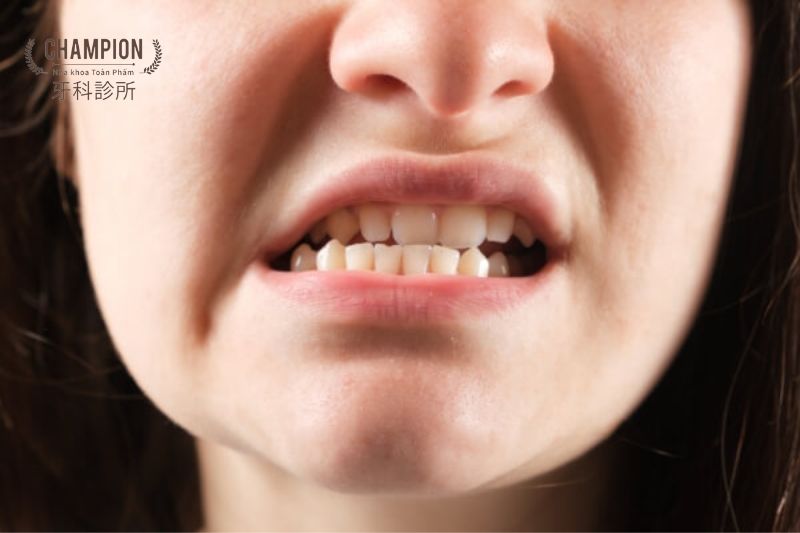Grinding teeth due to stress is a health issue that cannot be overlooked, as this condition not only affects the quality of sleep but can also lead to serious consequences for oral health and overall well-being. So, let's join Champion Dental Clinic to explore the causes, symptoms, and preventive measures for this condition.
Why Does Stress Cause Teeth Grinding?
Stress not only affects mental health but also leads to various physical health issues, including teeth grinding. When experiencing stress, the body reacts by increasing adrenaline production, causing heightened feelings of tension and readiness for "fight or flight" response.
In this state, muscles including those in the jaw often become tense and stiff, partly as an unconscious reaction to prepare the body to cope with stressful situations. This can lead to teeth grinding, especially at night when one may not have control over their behavior.

Signs of Teeth Grinding Due to Stress
Teeth grinding due to stress is a common condition that significantly impacts oral health and quality of life. To identify and address it promptly, understanding the symptoms of this condition is crucial. Below are some common symptoms of stress-induced teeth grinding:
Jaw Pain and Fatigue
One of the first and most common signs of stress-induced teeth grinding is a feeling of soreness and fatigue in the jaw, especially in the morning upon waking up. This can occur due to overworking the jaw muscles during sleep.
Headaches
Jaw tension from teeth grinding can spread to other areas, causing headaches, particularly in the temples and forehead. Headaches due to teeth grinding often occur in the morning after waking up.
Tooth Wear, Cracks, or Pain
Persistent teeth grinding can wear down tooth enamel, leading to cracks or fractures in teeth and even tooth pain. In severe cases, teeth grinding can result in tooth loss.
Increased Jaw and Facial Pain
Prolonged teeth grinding can intensify feelings of pain and tension in the muscles surrounding the face and jaw, causing discomfort and difficulty with eating.
Audible Grinding Sounds at Night
Roommates or sleeping partners may hear grinding sounds coming from the affected person, especially at night. This is one of the most easily recognizable signs observed by others.

Is Stress-Induced Teeth Grinding Dangerous?
Stress-induced teeth grinding can lead to significant consequences if not treated promptly and effectively. Specifically:
Tooth and Jaw Damage
Stress-induced teeth grinding can cause abrasion and damage to the surfaces of teeth. If prolonged, it can result in tooth decay, weaken their structure, and even lead to cracked, fractured, or missing teeth. Additionally, the jaw can also be affected, causing discomfort and pain.
Psychological Issues
Stress-induced teeth grinding can lead to constant feelings of tension and anxiety for the individual. Discomfort and restlessness during sleep can also decrease sleep quality and result in daytime fatigue. This continuous tension can affect mood and mental well-being, further exacerbating stress in a negative cycle.
Overall Health Impacts
Stress-induced teeth grinding not only affects oral health but can also contribute to various other systemic health issues. It can cause headaches, neck, and back pain, as well as digestive and sleep problems. In severe cases, it may be associated with cardiovascular issues and high blood pressure.

>> See more: What is teeth grinding? Causes and prevention methods
Effective Prevention and Treatment of Stress-Induced Teeth Grinding
While stress-induced teeth grinding can lead to serious issues, there are several ways to prevent and minimize its impact:
- Stress Reduction: Reducing stress can help alleviate teeth grinding. Seek stress-reducing methods such as meditation, yoga, regular exercise, and deep breathing techniques. If needed, seek psychological support from professionals to help you manage stress and foster positive emotions.
- Tooth Protection: Using a mouthguard during sleep can protect teeth and reduce grinding force.
- Dental Check-ups: Timely treatment of dental issues and regular dental check-ups help detect and address problems caused by teeth grinding.
- Improving Sleep Habits: Improving sleep quality can help reduce teeth grinding. Create a quiet and comfortable sleep environment, limit caffeine and alcohol consumption, and maintain regular sleep habits. If you have sleep issues, consult a doctor for proper advice and treatment.
- Expert Consultation: If your teeth grinding condition does not improve after trying self-care methods, seek advice and treatment from a dentist or specialist. They may recommend suitable treatment methods tailored to your condition, including the use of custom mouthguards and psychological treatment.
Conclusion
Stress-induced teeth grinding can impact your quality of life, but with effective treatment methods, you can reduce its effects and improve overall health. If you're experiencing this condition, visit Champion Dental Clinic for accurate consultation and examination by experienced dentists.
Vietnamese & English: (028) 5411-2295
中文: (028) 5411-2297 172 Nguyen Luong Bang, Tan Phu Ward, District 7, Ho Chi Minh City.
Fanpage: Champion Dental Clinic 牙科診所
Zalo: Champion Dental Clinic
Youtube: Champion Dental Clinic 牙科診所
 Champion Dental Clinic
Champion Dental Clinic



